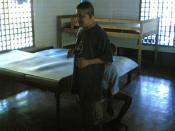Reference:
McMahon, Elizabeth. Lost in Music [online]. Meanjin, Vol. 59, No. 2, 2000: 166-177.
Ari's description of the four sections of the city interlace demographic information with personal affect. Sex, drugs and alcohol will ease the strain on Ari's groin, that will take away the burning compulsion and terror of his desire. But here at the novel's space of endpoint and stasis he does not identify any independent capacity for pleasure. Ari exposes the under-belly of the city by charting trajectories and spaces of the city's excess: forbidden desires, sexual transgression, waste and decay. If the map of the city is the governance of culture and language, this dynamic tour offers the possibility of an individual activity and expression. In Loaded and Head an this utterance is somatic, indeed intensely physical. It is an enunciation made by the body as it moves through, occupies and experiences space.
Ari accelerates the pace and enhances the experiences of his walking with drugs and music, Speed transforms Ad's walk to a dance.
These dark paths and silent alleyways are actual places in this novel. They become spaces of experience that have required detours off the main road. As an outsider to the circle of dancers Ari raises questions about the putative inclusiveness of this scene of community.
Perhaps the most powerful agent of motility and speed in Loaded is music. Ari provides a soundtrack to accompany and propel his dromomania; he walks to the beat, tempo and dynamics of music. In
Loaded each of the four compass-point sections of the novel is prefaced by an epigram from a song. Each epigram provides a key note or quality that characterises the particular territory of Melbourne and Ali's experiences there. Music is thus inextricable from both the official map and the personalised tour, and with...


